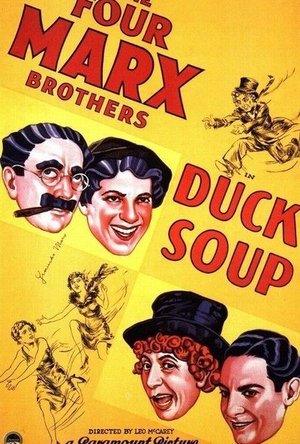Search
Search results
RəX Regent (349 KP) rated Duck Soup (1933) in Movies
Feb 18, 2019
“You’re a brave man. Go and break through the lines. And remember, while you’re out there risking your life and limb through shot and shell, we’ll be in be in here thinking what a sucker you are” Rufus T. Firefly
And the one liners just keep on coming…
Here we have before you one of the most famous entries form The Marx Brothers as they made their indelible mark on Hollywood(land) and the silver screen back in the 1930’s, moving away from their Vaudeville roots to new level of immortally on celluloid.
The fifth film to credit the “The Marx Brothers”, Duck Soup in on one hand a sharply written satire on the weakness of mob mentality to willingly promote unwelcome change to their society and their willingness to follow just about any lunatic as long as they like what they hear; as well as a straight forward slapstick comedy of the time, in keeping with its music hall roots.
It is the music hall aspect of this classic which can be harder for a modern audience to take to, unless you are already disposed to this sort of rather dated humour. But as a satire, it is brilliant and still very funny over seventy years on.
Groucho Marx steals the show as Rufus T. Firefly as he leads his unwitting and possibly dimwitted fictional country of Fredonia (geddit?) to war and ultimate destruction. He is a character, whilst not in any way taking off Adolf Hitler, who was of course rising to power in Germany at this very moment, was clearly a reflection on this type of reckless and charismatic leader and as the hilarious final act demonstrates, is all too common in history and even in our present.
And the fact that Fredonia is ultimately doomed, was a coincidental foreshadowing of Nazi Germany’s fate a decade later, as well as a clear demonstration of the savvy writing.
Witty, whether it is the physical trademark Marx Brothers comedy or the sharp screenplay by Bert Kalmar and Harry Ruby, based on the stage version of the same name, this a classic satire; whilst not being as hard hitting a s Chaplin’s works of the period, with The Great Dictator (1940) springing to mind, it still holds up and makes its point without hammering you over the head it.
So, you can just enjoy the show and/or take away the message, it is really up to you.
Here we have before you one of the most famous entries form The Marx Brothers as they made their indelible mark on Hollywood(land) and the silver screen back in the 1930’s, moving away from their Vaudeville roots to new level of immortally on celluloid.
The fifth film to credit the “The Marx Brothers”, Duck Soup in on one hand a sharply written satire on the weakness of mob mentality to willingly promote unwelcome change to their society and their willingness to follow just about any lunatic as long as they like what they hear; as well as a straight forward slapstick comedy of the time, in keeping with its music hall roots.
It is the music hall aspect of this classic which can be harder for a modern audience to take to, unless you are already disposed to this sort of rather dated humour. But as a satire, it is brilliant and still very funny over seventy years on.
Groucho Marx steals the show as Rufus T. Firefly as he leads his unwitting and possibly dimwitted fictional country of Fredonia (geddit?) to war and ultimate destruction. He is a character, whilst not in any way taking off Adolf Hitler, who was of course rising to power in Germany at this very moment, was clearly a reflection on this type of reckless and charismatic leader and as the hilarious final act demonstrates, is all too common in history and even in our present.
And the fact that Fredonia is ultimately doomed, was a coincidental foreshadowing of Nazi Germany’s fate a decade later, as well as a clear demonstration of the savvy writing.
Witty, whether it is the physical trademark Marx Brothers comedy or the sharp screenplay by Bert Kalmar and Harry Ruby, based on the stage version of the same name, this a classic satire; whilst not being as hard hitting a s Chaplin’s works of the period, with The Great Dictator (1940) springing to mind, it still holds up and makes its point without hammering you over the head it.
So, you can just enjoy the show and/or take away the message, it is really up to you.
